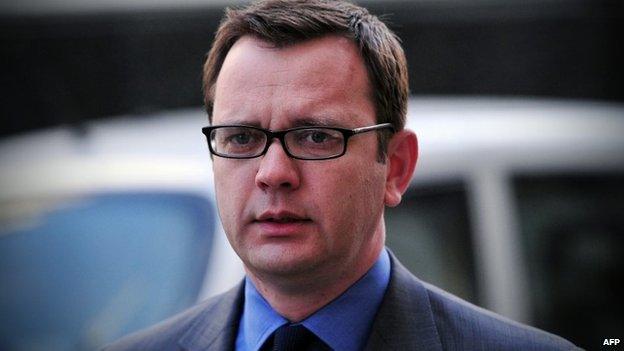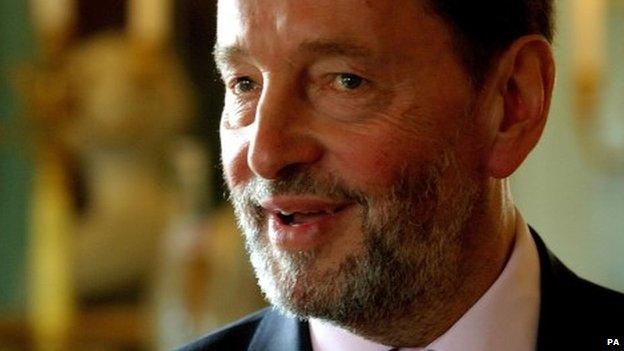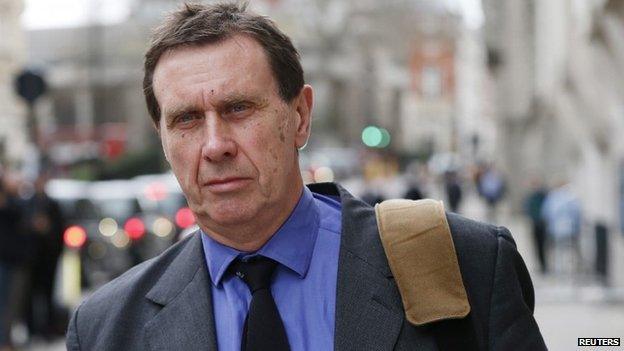Andy Coulson: I regret exposing David Blunkett affair
- Published

Mr Coulson again denied knowledge of phone hacking at the paper
Former News of the World editor Andy Coulson has told the phone-hacking trial he regrets his decision to expose ex-home secretary David Blunkett's affair in the paper.
Mr Coulson said it had been a "mistake" and the irony was "not lost" on him, in view of his own on-off affair with his co-defendant, Rebekah Brooks.
Under cross-examination, Mr Coulson also denied knowledge of illegal phone hacking by NoW reporters.
He denies conspiring to hack phones.
He also denies conspiring to commit misconduct in a public office.
Mr Blunkett was home secretary in 2004 when the NoW revealed that he had been having an affair with then Spectator magazine publisher Kimberly Quinn.
He resigned later that year.
In an exchange with David Spens QC, a lawyer acting for former NoW royal editor Clive Goodman, Mr Coulson said he had made a mistake in deciding to pursue a story about Mr Blunkett's private life.
Mr Coulson said: "This was about someone having an affair, and given what was going on in my life, the irony is not lost on me."

Mr Coulson met then home secretary David Blunkett but did not tell him he had heard his voicemail
Mr Spens then accused Mr Coulson of hypocrisy. Mr Coulson replied: "As I have said, the irony is not lost on me."
The court heard that in August 2004 Mr Coulson went to Mr Blunkett's home to question him about the affair but did not tell him he had heard an intercepted voicemail that the home secretary had left on Ms Quinn's mobile phone.
Mr Spens said: "Do you feel any shame about what you did?" Mr Coulson replied: "I regret it, yes."
Earlier the former editor was questioned about members of his senior staff at the NoW who have pleaded guilty to phone hacking.
In each instance Mr Coulson denied any knowledge of their activities.
Mr Coulson said that when the paper's chief reporter at the time, Neville Thurlbeck, had played back to him an intercepted voicemail left by Mr Blunkett he had told the reporter to stop such activity.
Mr Coulson was repeatedly asked about his claim that he did not ask Mr Thurlbeck how he had gained access to the message.
He said he had told the reporter to "stop" but he did not "explore further".
He denied suggestions that he was not curious because he knew phone hacking was happening at the paper.
Pressure
Asked if Mr Thurlbeck had received a written warning because of his behaviour, been the subject of a disciplinary process or been reported to the Press Complaints Commission, Mr Coulson replied: "No."
In other testimony, Mr Coulson denied putting pressure on his royal editor to use phone hacking to get stories.
"I did not ask Clive Goodman to do that," he said.
Mr Spens continued: "Not only did you know about hacking, you were putting pretty strong pressure on him to do better."

A lawyer for Clive Goodman (above) said Mr Coulson had offered financial help so his client "wouldn't rat"
Mr Coulson said: "I had put legitimate pressure on Clive to improve his performance."
The former editor was also asked about a meeting he had with Mr Goodman in August 2006, after the former royal editor had been arrested on suspicion of illegally intercepting phone messages.
Mr Coulson denied he had offered Mr Goodman the prospect of work back at the paper if he pleaded guilty.
'Twisted'
Mr Goodman's barrister suggested Mr Coulson had offered financial help so Mr Goodman "wouldn't rat" on other people at the paper.
"No," Mr Coulson replied.
The former editor said a conversation may have taken place about his concern for Mr Goodman and his family but added that his words had been "completely twisted".
Mr Coulson was also asked about allegations that he had told Mr Goodman he had influence over the police and wanted to stop the phone hacking investigation going deeper.
He said: "The paper had a difficult relationship with Sir Ian Blair, the Commissioner of the Metropolitan Police, and I don't think we could have any influence over him. We had been very critical of him over [the killing of] Jean Charles De Menezes, external."
Mr Coulson, 46, of Charing, Kent, is one of seven defendants in the hacking trial. All deny the various charges against them.
The case continues.